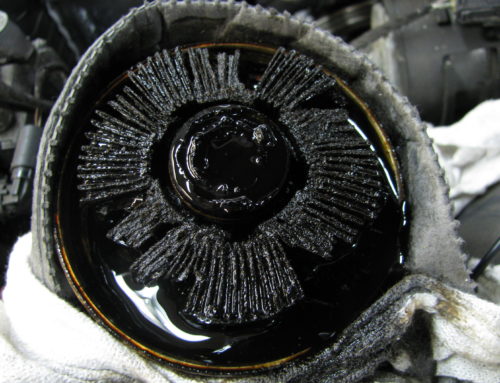Almost all the cars we now work on use synthetic oils, but there still seems to be some confusion on what the types of oils are, and what the differences are. Oil is the lifeblood of your engine. The purpose of motor oil is to lubricate and protect your engine from heat and friction; the two major enemies of your engine. Without oil, your engine would overheat and cease working. Your engine might even crack. Motor oil may be the single most important fluid you will put in your engine.
What Is Petroleum Oil?
Crude oil, better known as petroleum oil, is pumped from the earth, refined, and sold as a lubricant. In spite of the refining process, which is imperfect, contaminants that are not beneficial for your engine will be introduced using petroleum motor oil. Petroleum motor oils contain a different-sized molecular structure that contains properties both beneficial and non-beneficial. Petroleum motor oil has been the predominant automobile lubrication product for generations. If changed regularly, petroleum motor oil will provide a measure of protection for your engine, but not necessarily the best measure of protection. What are some of the issues with conventional, petroleum motor oil?
* High oil temperature in excess of 240F will break down petroleum oils and cause oxidation, which in turn forms deposits, varnish, and increases wear.
* Low oil temperatures will cause formation of sludge, which can block oil passages.
* Very low temperatures of -40F will make oil too thick to flow at all.
For dependable performance and long-term engine protection in all motor vehicles in all climatic conditions, petroleum oils must be supplemented with expensive additives that prolong the oil service life and reduce the wear to an acceptable level.
What Is Synthetic Oil?
Synthetic motor oil is a laboratory manufactured, custom-designed product that contains a uniform-sized molecular structure and is pure from any of the non-beneficial properties found in conventional petroleum motor oils. Before being introduced to automobiles, synthetic oils were first used in fighter jets. Synthetic oils were first introduced to the consumer market in 1972 and have grown in popularity because of the superiority in protecting today’s high performance engines.
Which is Better?
Every year motor oil companies spend millions promoting their product; the majority of them petroleum motor oils. Although petroleum motor oil will provide adequate protection, there are some reasons why synthetic motor oil is the better choice when it comes to protection for your engine. Why settle for adequate protection? Synthetic motor oils have clear advantages. Let us look at some of these advantages.
Longer Oil Change Intervals
Unlike petroleum motor oil, which must be changed every 3,000 to 5,000 miles, synthetic motor oil can go 6,000 to 10,000 miles between oil changes. Longer oil change intervals, means fewer trips to the shop (hey….that’s us…..you can still come visit at any time) or time spent underneath your car.
Better For The Environment
Because synthetic motor oil lasts about three times longer than petroleum motor oil, change intervals are significantly longer. Fewer oil changes reduce the waste-disposal problem that comes with changing your oil, which leads to a healthier, greener planet for all of us.
Higher Resistance To Breakdown
Petroleum motor oils are prone to boil or vaporize within the normal operating temperature of the engine. This is commonly referred to as breakdown. Once the oil begins to breakdown, it usually results in oxidation, creating hardened oil deposits -more commonly know as sludge- in your engines components. Synthetics by contrast, are able to withstand greater heat temperatures, resulting in greater protection against breakdown. We can also say that we can immediately tell what type of oil the car has been using just by pulling the valve cover on the motor. Synthetics produce a cleaner cam area, petroleums produce sludge and grim. We can also tell, with both types of oil, how often a car has had it’s oil changed….so, if you wonder about wear and protection, yes, we can see it just be looking at the valve cover and cam area.
Provides Superior Heat Protection
Heat is a major enemy of any engine. Heat produces friction, and friction produces wear, and wear reduces the life of your engine. The uniformly smooth structure of synthetic motor oil, free of the contaminates found in conventional petroleum motor oil, provides superior protection against heat, friction, and wear on your engine.
Provides Superior Start-up Protection
Petroleum motor oils contain waxes and paraffins which can thicken when exposed to cold temperatures. Cold petroleum oil makes it difficult for the oil to get from the oil pan to the moving parts of your engine during cold-weather start-ups. Meanwhile, until the oil heats up and is fluid enough to circulate through your engine, damage is occurring to your engine, which over time can reduce the life of your engine. Synthetic motor oil on the other hand, does not contain these waxes and has fluidity properties that allow it to get into your moving parts almost immediately, providing greater protection for your engine.
Conclusion….unless you have a specific reason to use petroleum oil in your car….DON’T. Use the newer synthetics….your car will love you for it.




Leave A Comment
You must be logged in to post a comment.